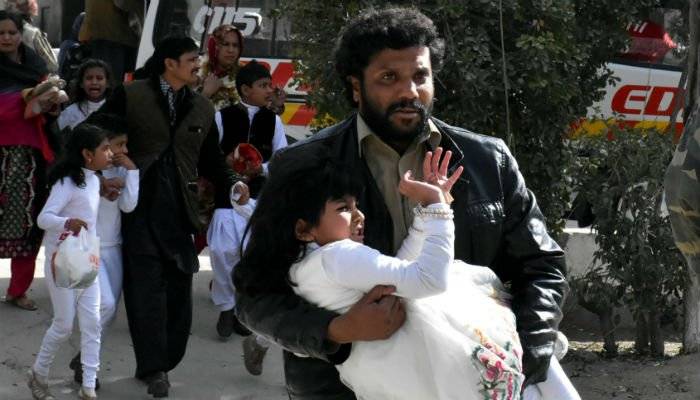I was appalled to hear the news of a heinous attack on the worshippers at Bethel Memorial Methodist Church in Quetta. My inner Pakistani instantaneously got scared to face the portrait of Jinnah, garnished on the wall of my guest room. I could recall his remarkable speech:“You are free; you are free to go to your temples, you are free to go to your mosques or to any other place or worship in this State of Pakistan. You may belong to any religion or caste or creed - that has nothing to do with the business of the State.” I inquired myself, have we been able to establish a society in 70 years where Muslims, Christians and Hindus may go to their worship places without an ounce of fear in their hearts and minds? The blood stained walls of mosques, churches and shrines; heart wrenching screams and pleadings of thousands of injured; and silent grumbled faces of Pakistanis proclaim the otherwise.
The science of fundamentalism and fanaticism is enigmatic. The driving force behind the local and international terrorist organisations to execute nefarious activities is the same i.e. ideology. Yet, they diverge in their interests. The attack on Quetta's Church was claimed by militant Islamic State (ISIS) though it is no different when it comes to the thinking paradigms of home grown fundamentalists.
The attack on Quetta’s church just few days before Quaid’s Day (and Christmas Day) is a ridiculously mock in our faces that we are no longer tenacious to provide a peaceful and tolerant Pakistan to the minorities, as envisaged by Jinnah.
Two weeks ago, I met an APS Peshawar attack survivor, Akif Azeem, at an international leadership summit. He was of the opinion that the state couldn’t protect us. I was inclined to think that the state couldn’t protect students then in December 2014; and it couldn’t even save students at Agriculture Training Institute this December, too. From Al-Qaida to BLA; and from TTP to ISIS, we have travelled long on the destructive road of insinuations and justifications. The four decades, since 1980, have come to a conclusion but we couldn’t segregate the two mindsets marauding the same ideology. One mindset: that operates on foreign agenda outside from Pakistan and inflicts our society, by large. Second mindset: being radical and fanatic, nurture in our own society.
The state formulated the policies to impede external forces who have been eroding the very fabric of Pakistani society but it failed to cope with the home grown fundamentalism. This extremist mindset has infiltrated our society to an extent that we witness people so ready to take life in the name of religion, ideology and sect. The attackers of Quaid-e-Azam's residency in Ziarat were those who got education in our own schools or madrassahs. The murder of Mashal Khan in Mardan is yet another embodiment of how the society has become a bloodthirsty vigilante.This very fascist frenzy incident concocted an impression that it represented the sentiments of majority.Why is this so? Popular opinion calls the shot that Pakistan’s descent into madness is the product of an ideological shift.
By far now, madrassahs were being castigated on reproducing hardline ideology among the students. The war-spiced curricula, blended with inflamed rhetoric of Islamic doctrines were driving the juvenile minds of lower and middle class, by large. But the somber events that have taken place in universities are the blunt questions to our priorities of tackling with this mindset. Whether it is about Naureen Laghari (MBBS student from Hyderabad) who joined ISIS and got training in Syria or of Saad Aziz (BBA student of IBA), who murdered progressive human rights activist Sabeen Mahmud; the question remains the same that what ideology had inspired them the most? It has seen that polarisation of religious ideology has bifurcated our society into more and less tolerant segments. If a madrassah student blows himself up to satiate his religious beliefs and an educated university student takes someone’s life in the name of fundamentalism; which curricula of ideology and belief make them two different mindsets?
It was not only the literature but also the films which inculcated extremist thinking in society. In the '90s, Lollywood and Hollywood were two film industries which were propagating violence through their films. Action movies teeming with high-degree violence were instilling a new collective national psyche in Pakistani society i.e. extremist thinking. It was only Bollywood at the time that was trying to balance the polarisation of action movies. By giving its indigenous audience and to the world, Bollywood disseminated romantic movies so that the mania of radical thinking could be abated to certain extent.
These aspects are very pronounced because Pakistan is one of the most obscenely unequal societies in the world, where millions of under-employed and poorly educated young men, living estranged lives with grim prospects, become useful fodder for fundamentalist entrepreneurs, who later persuade them of the possibility of seeking purpose in fighting imaginary threats to religious honour.
We are now at the point where we no longer have much choices. The state must act now. Peace is inevitable if home grown fundamentalism is not curbed along with external attacks. Pointing out 1980, the origin of radical thinking, all the time and not finding solutions to turned it down is like beating the dead horse. This is the watershed moment to implement National Action Plan (NAP) in its true spirit with sincerity and sagacity. It is a dire need to implement 5th point of NAP that says, “Strict action against the literature, newspapers and magazines promoting hatred, extremism, sectarianism and intolerance.” The totalitarian ideology of few must not be cynically mobilised in the society. The state must prevail over the personal. We can never win this war against extremism if we keep on shunning the home grown fundamentalism, being nurtured by our own people.






